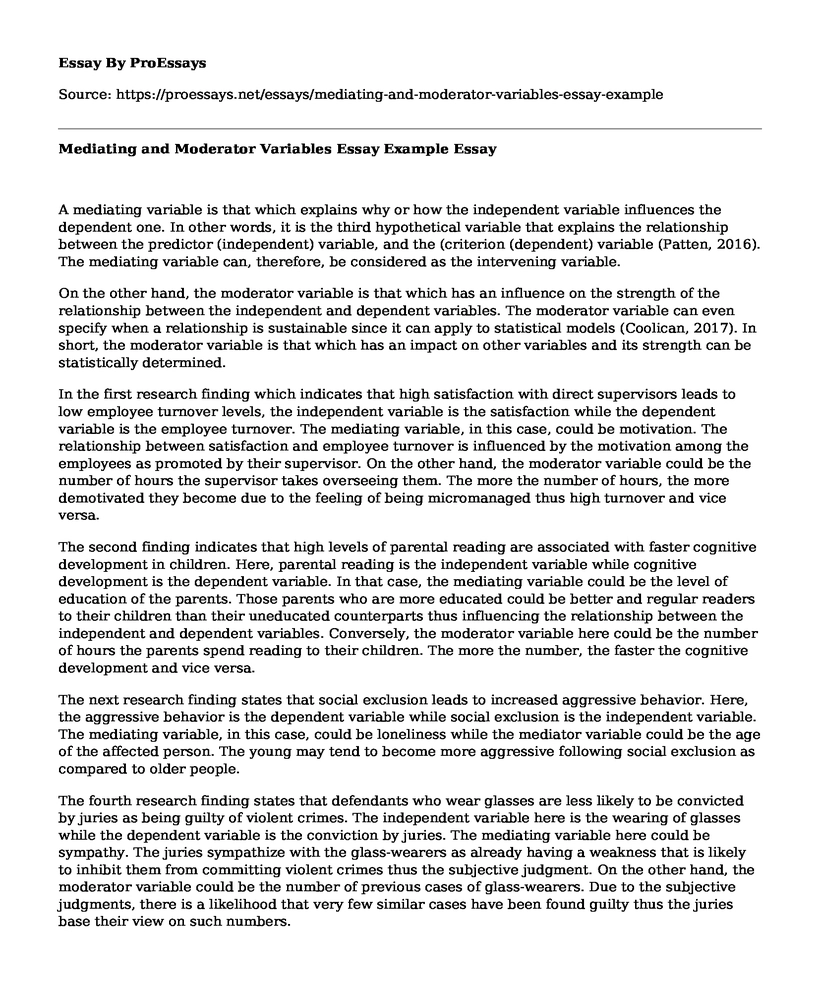A mediating variable is that which explains why or how the independent variable influences the dependent one. In other words, it is the third hypothetical variable that explains the relationship between the predictor (independent) variable, and the (criterion (dependent) variable (Patten, 2016). The mediating variable can, therefore, be considered as the intervening variable.
On the other hand, the moderator variable is that which has an influence on the strength of the relationship between the independent and dependent variables. The moderator variable can even specify when a relationship is sustainable since it can apply to statistical models (Coolican, 2017). In short, the moderator variable is that which has an impact on other variables and its strength can be statistically determined.
In the first research finding which indicates that high satisfaction with direct supervisors leads to low employee turnover levels, the independent variable is the satisfaction while the dependent variable is the employee turnover. The mediating variable, in this case, could be motivation. The relationship between satisfaction and employee turnover is influenced by the motivation among the employees as promoted by their supervisor. On the other hand, the moderator variable could be the number of hours the supervisor takes overseeing them. The more the number of hours, the more demotivated they become due to the feeling of being micromanaged thus high turnover and vice versa.
The second finding indicates that high levels of parental reading are associated with faster cognitive development in children. Here, parental reading is the independent variable while cognitive development is the dependent variable. In that case, the mediating variable could be the level of education of the parents. Those parents who are more educated could be better and regular readers to their children than their uneducated counterparts thus influencing the relationship between the independent and dependent variables. Conversely, the moderator variable here could be the number of hours the parents spend reading to their children. The more the number, the faster the cognitive development and vice versa.
The next research finding states that social exclusion leads to increased aggressive behavior. Here, the aggressive behavior is the dependent variable while social exclusion is the independent variable. The mediating variable, in this case, could be loneliness while the mediator variable could be the age of the affected person. The young may tend to become more aggressive following social exclusion as compared to older people.
The fourth research finding states that defendants who wear glasses are less likely to be convicted by juries as being guilty of violent crimes. The independent variable here is the wearing of glasses while the dependent variable is the conviction by juries. The mediating variable here could be sympathy. The juries sympathize with the glass-wearers as already having a weakness that is likely to inhibit them from committing violent crimes thus the subjective judgment. On the other hand, the moderator variable could be the number of previous cases of glass-wearers. Due to the subjective judgments, there is a likelihood that very few similar cases have been found guilty thus the juries base their view on such numbers.
Conclusion
In conclusion, it is clear that there is a difference between the mediating and moderating variables. While the mediating variable explains the relationship between the independent and dependent variable, the moderating variable influences the strength of the independent variable on the dependent one. For each of the four research findings discussed in this essay, the different variables are clearly explained.
References
Coolican, H. (2017). Research methods and statistics in psychology. Psychology Press.
Patten, M. L. (2016). Proposing empirical research: A guide to the fundamentals. Routledge.
Cite this page
Mediating and Moderator Variables Essay Example. (2022, Nov 20). Retrieved from https://proessays.net/essays/mediating-and-moderator-variables-essay-example
If you are the original author of this essay and no longer wish to have it published on the ProEssays website, please click below to request its removal:
- Why Do Most Researchers Use The P-Value Statistical Method Over The Critical Value Method?
- Health Information Exchanges Essay Example
- Financial Resources & Access to Supermarkets Impact Diet Choices
- Technology & Cancel Culture: Exploring Racism, Sexual Assault & LGBTQ Discrimination
- Essay on Weighted Mean in Statistical Analysis: Understanding its Significance
- Paper Example on 90% of US Struggling with Addiction: Refining Access to Treatment Services
- Essay Example on Corporal Punishment: 50-65% of Parents Use It for Toddlers and Teens







